SUMMER OF SONG: THE MAGNIFICENT 7 CONCERTS OF THE SUNSHINE SEASON
From Afro-Brazilian through Gospel, Reggae, R&B, Fado and more - gigs that brought musical sunshine across my London summer.
Give the drummer some: Jake Xexeres Russell’s drummer gets to work.
Autumn’s encroaching on this part of the world and, as the days get shorter and shadows longer, a chill returns to the air. Strange as it may sound but I welcome autumn, if only because, as a lover of live music, this is the season when London once again begins to overflow with concerts.
Not that I dislike summer – as a cyclist, it’s been bliss – but summer sees a lot of musical activity focused on festivals and far less interesting concerts in the venues I like to attend. With people away on holiday or, if in London, less willing to enter dark venues when they could be outside, turn the venues programme less music of note.
This said, summer did find me attending two boutique festivals (Maverick and Skabour – both exceptional) and a selection of striking concerts. So to wave goodbye to summer I’m going to honour the magnificent seven concerts that lit up the long weeks I spent in London town. Each of these very different concerts was inspirational – if you were at any of them then please comment. And if you witnessed a magnificent live performance, then let me know (and I’ll aim not to miss that artist next time they’re in town).
MARGARETH MENEZES / ILE AIYE – BARBICAN CENTRE July 26
July started off horribly wet and cold so how about a double bill of Afro-Brazilian music to welcome in the spirit of summer? Both Ilê Aiyê and Margareth Menezes are from Salvador, Bahia, the predominantly Black city in Brazil’s northeast, and both embody tropical, sunshine energies.
Ilê Aiyê originally took shape as a carnival block – the name given to street bands who, by mixing Brazilian rhythms with chants, mobilise crowds on the streets – and their seven male percussionists took the stage beating out furious samba rhythms. They were soon joined by male and female vocalists, who warmly welcomed the audience to join the party. Then two stunning female dancers began gliding across the stage. All dressed in golden robes, Ilê Aiyê performed with such uplifting energy that the Barbican’s formal concert hall was transformed into a street party, the largely Brazilian audience joyously dancing throughout the venue.
Founded in 1974, the ensemble initially called their block Poder Negro (Black Power), which brought problems with Salvador’s predominantly white police force. The block then changed their name Ilê Aiyê – Yoruba for “our house” – and focused on empowering black Brazilians, not just through song and dance but by emphasising self-worth and African heritage. This determination to honour both the ancestors and their community shone through at the Barbican, Ilê Aiyê’s dynamic blend of hard polyrhythms and supple, sweet voices proved exciting and intoxicating – here was a taste of Bahia’s carnival fervour.
After intermission Margareth Menezes took the stage backed by a drummer, two percussionists, guitar, bass and keyboards. The singer, 61, appeared unconcerned about matching the wild party spirit that had ignited the evening, her powerful voice and majestic presence ensuring the audience sat and listened – at least initially. Menezes broke thought in Brazil in the 1980s and came close to winning international fame in 1990 when a song of hers appeared on the soundtrack of Wild Orchid, a trashy Mickey Rourke sexploitation film. Island Records issued a Menezes compilation and US and European club DJs embraced Menezes’ axé sound – axé being a Salvadorean fusion of Afro-Brazilian rhythms with other musical genres.
Crossover success didn’t follow, Menezes instead enjoying a long, successful career at home: she is now Minister of Culture in Brazil’s government (the tropicalista singer Gilberto Gil occupied this position in President Lula’s previous government). Menezes’ music is built on samba rhythms, while drawing on myriad influences – one song had a jazz-funk flavour reminiscent of Level 42, while another employed a guitar motif reminiscent of U2. Looking resplendent in a flowing black and white robe, she sang her hits, several of which had the audience singing along, while slowly turning up the rhythmic heat.
This well paced performance ensured Menezes also got the audience up and dancing. Finishing on a high, Menezes welcomed Ilê Aiyê back for a show-stopping samba celebration. As the collected ensemble partied across the stage Menezes took time to praise Lula, Gil and the Brazilian diaspora – in Portuguese, not a word in English having been uttered from the stage across the entire concert.
HARLEM GOSPEL TRAVELLERS – 229 28 July
“Hands up everyone who loves Jesus,” commands George Marage from the stage of London venue 229. The audience dutifully raises hands, although I doubt many of us have recently bowed our head in prayer. Marage nods thanks and the Harlem Gospel Travellers start singing God’s Love. The beautiful voices and slick stage moves that inform the youthful trio’s performance suggest they are part of the historic African American tradition of singing redemption songs. Yet the HGT are, in one way, radically different from their precursors – the trio being openly, happily gay.
I first saw the HGT perform in London two years ago. Back then I guessed they might be gay – two of the three members had very stylised hair and fiddled with it on stage – but they dressed in the formal clothing of US gospel and gave no hint of sexuality in the songs they sang. Since then they’ve come out, noting when I interviewed them (for The Guardian – its online if you are interested in reading more) that people kept on commenting “they so gay” thus why bother hiding?
This performance was that of a liberated trio: lead vocalist Ifedayo Gatling took 229’s stage in a purple sequins bodysuit, platform boots and heart shaped glasses, his chest-length hair immaculately styled and teased. Elton John is a fan and has hosted them on his Apple radio show and Mo Heart (a regular on RuPaul’s Drag Race) also champions the trio and HGT have determined that, like those aforementioned queer icons, they too will celebrate by being outlandish.
This noted, if the HGT were only winning attention due to their sexuality then they’d be a niche outfit. Instead, new album Rhapsody find the trio and their producer, Eli “Paperboy” Reed, having selected ten songs from the Numero label’s Good God! A Gospel Funk Hymnal series (which gathered obscure gospel recordings from the 1960/70s), producing dynamic soul gospel.
The trio, backed by a tight quartet (drums, bass, guitar, keyboards – the guitarist is American, the other three Spanish: HGT had been touring Spain), put on a powerful show of soul gospel while also filled with showbiz pizazz (many famous gospel singers have been gifted entertainers). Strong message songs We Don’t Love Enough and Searching For The Truth work both as religious and secular parables, and HGT perform them with great conviction. By returning gospel to its roots the trio are refreshing the genre in a manner comparable to how Sharon Jones’ Daptone recordings reinvigorated US R&B.
The HGT are superb in concert and on record: I think they possess real crossover potential and, right now, there appears to be plenty of secular enthusiasm for the soul gospel era (1950s – 1970s), the Numero reissues being just the latest of many. While Staples Jr Singers, the two brothers and a sister who made a selffinanced album in the mid-1970s and existed in obscurity until Luaka Bop reissued it and resurrected the Mississippi outfit, have also been touring widely (and released a new album Searching – its good). I missed the SJS London concert this summer as I was out of town on that date but, having seen them before, I’m sure they testified with gravitas.
JOHNNY OSBOURNE - PECKHAM FOOD COURT August 11
While I love living in Peckham I’d never make claims for it being a major live music hub so imagine how surprised I was when, doing some shopping on Rye Lane, I saw a mustard, A4 size sheet stuck in a shop window that announced Johnny Osbourne would be singing in Peckham in a ten days time. And, seemingly, he would not be singing in Peckham Levels (which occasionally hosts jazz jams) or Peckham Audio (basement venue – indie rock oriented) but in the food court on Rye Lane that’s opposite where buses collect passengers.
Even more surprising was the ticket price: £5 – I went home, checked online to ensure it wasn’t a scam (seemingly not), then booked a ticket (£6.24 with booking charges). The ticket specified that you had to enter by 8.30 – knowing how late some reggae gigs run I was a little concerned that I might be standing around for hours but, at least, I could walk there. So off I went.
Inside almost all the food court was closed beyond a bar and one vendor. A sound-system had been set up in a small open space towards the back (obviously, for a fiver I knew Johnny wouldn’t be fronting a band). There was a decent enough crowd, both older dreads and reggae fans who likely saw Osbourne when he first started performing in the 1970s, and then lots of us middle aged types. There were some younger couples – reggae appeals across generations in a way few other genres do – and it felt quite old school Peckham, a mix of races and sexes, no one wearing bling or demonstrating attitude. Actually, it was a humid night so shorts and T-shirts abounded.
A DJ was playing reggae tunes at an acceptable volume and my only gripe was was there being nowhere to sit – I was still worried we might have to wait a long time. And then, at 20.50, there was a hush, the DJ stopped, another man took his place and suddenly an older Jamaican man with grey dreads was being ushered through the crowd. Johnny grabbed the mic’ and immediately began singing, his voice strong, and everyone moved forward and cheered.
Again, suspicious mind that I have, I thought Osbourne might only do a brief set. 90 minutes later he was waving goodbye after an extraordinary performance. Actually, if he’d ended twenty or thirty minutes earlier I would have been satisfied – backed only by his selector DJ Frenchie, Osbourne was singing over pre-recorded rhythm tracks and, at least for me, this can begin to sound rather flattened.
Ice Cream Love, In Your Eyes, Fally Lover, Warrior, Kiss Somebody, We Need Love – Johnny sang his hits and more. He’s amongst the most romantic of reggae singers and his voice, after 55 years of singing professionally, is in remarkably good shape. After he finished Prince Fatty, the Brighton-based DJ and producer, took over but my legs were saying “enough standing”. Best value gig of the summer (if not the year).
DIZ & THE DOORMEN – THE PELTON ARMS August 17
Diz Watson is the gentle giant of European rhythm and blues. Like many youths who fell hard for American R&B in the 1960s, Diz determined to play it. Fortuitously, in Halifax, the Yorkshire town next to his, lived Champion Jack Dupree, a transplanted legend of New Orleans piano. Young Diz got his address, knocked on the door and, when it was opened by Jack’s Yorkshire girlfriend, explained why he was calling. She welcomed Diz in and Jack heard the nervous youth out. He then kindly said “sure thing” and began giving the teenager lessons in piano magic.
Since then Diz has focused on playing swinging boogie woogie piano, the kind that makes people smile and dance and forget their troubles. With Diz Connected (Lost Music), his new album, he continues to do so. And the results are magnificent.
These days Diz again lives in Yorkshire but pops down to play London concerts on occasion. Leading his band at Greenwich pub The Pelton Arms was ideal for me as its an easy cycle from Peckham. And a very decent pub. Plus there’s no cover charge.
Things took a while to get going – some of Diz’s Doormen band members were stuck in North London traffic but, when they did arrive, a celebration of New Orleans R&B took hold. Diz not only learnt from Champion Jack, he toured as Dr John’s pianist in the 1980s – Rebennack liked Diz’s playing so much the New Orleans magus concentrated on playing guitar – and has befriended/worked with Professor Longhair, Clarence “Frogman” Henry and other luminaries from the Crescent City.
Tony Uter, the 95-year old Jamaican percussionist I celebrated on the Yak earlier this summer, has been Diz’s sidekick for decades but, sadly, wasn’t feeling up to coming out this evening. Still, the band played superbly, Diz singing standards and the occasional original, while, at one point stretching out into an Abdullah Ibrahim composition. Its not often you find an artist who can sing Hank Williams and Fats Domino tunes then play South African modern jazz. And, with Diz, everything sounds like it naturally flows together.
Check out Diz Watson – if you ever get the chance to see him perform its a treat. And also check out Diz Connected, an album that keeps the tradition of Champion Jack, Dr John, Professor Longhair and other piano masters alive while being helmed by a gruff Yorkshireman. Oh, writing on Diz reminds me that I went to Ronnie Scott’s and saw Jamaican jazz pianist Monty Alexander in early summer, and good he was too.
LEYLA McCALLA - THE MOTH CLUB August 26
More than a decade ago I saw The Carolina Chocolate Drops perform at a books & music festival in Utrecht. They were a lot of fun if a bit hokey in their desire to be a “good-fun-old-timey-string-band”. While I enjoyed hearing young African American musicians enthusiastically playing the music their ancestors developed a century ago, I didn’t pay a lot of attention. Which means I didn’t notice Rhiannon Giddens’ now undoubted star potential - since going solo she’s turned into the most popular female folk singer since Joan Baez. Also: I can’t state if Leyla McCalla was a member of the Chocolate Drops around that time. She played cello in the band for a couple of years so could have been. But I can’t remember what year I saw them in so, hey-ho…
I’ve followed Leyla’s solo career ever since I heard her 2014 debut album Vari-Colored Songs: A Tribute to Langston Hughes. Here, on cello, accompanied by other string instruments, she created a tender yet fierce album celebrating African American creativity and New Orleans as a hub for such. 2019’s Capitalist Blues was a strong alt.folk album while I delighted in 2022’s Breaking The Thermometer - here she went to Haiti, where her parents hailed from, and, firstly, worked up a play using tapes from Radio Haiti, the songs of which she developed into the album. I love Haitian music and hearing McCalla sing in Kreyol was a delight. This year’s Sun Without The Heat album is a return to indy folk ie all the songs are in English. I was a little disappointed on first listen but time has taught me that the strong songs resonate and I’ve since found myself regularly returning to listen.
At Hackney’s Moth Club McCalla led her band through a confident set on a hot August night. She played a variety of instruments and sang in English and Kreyol, her guitarist playing sparkling Haitian melodies to accompany such songs. For a folkie, McCalla makes a very confident rocker, leading her band through several joyous guitar workouts.
It’s perhaps McCalla’s ability to span musical genres so effortlessly that’s stopped her winning the wider audience she deserves. Leyla sings well, has strong songs, engages with her audience - telling us of how she needs to hurry home to her 3 babies in New Orleans - and is notably unique. If you get the op’ to see Leyla McCalla then do.
JAKE XERXES FUSSELL – LAFAYETTE August 30
What can I tell you about the American folk singer with the difficult-to-pronounce middle name? He was raised in Georgia by parents who were folklorists, so grew up going to hear vernacular musicians perform across the US South. Fussell went from listening to performing as a teenager and has followed in the tradition of many other musicians - think everyone from Woody Guthrie to Bob Dylan (and beyond) - who adapted folk songs to fit their voice(s).
I became aware of Jake only in the past few years - seemingly when many others did (I’ve no idea why. I imagine that his music has quietly attracted more and more attention so leading to the kind of word-of-mouth success that streaming/YouTube allows for). He’s never been hyped: I’ve not read an interview with him or heard him do a radio session. Appropriately, Fussell exudes an old fashioned intrigue, his music having a mumbled, mysterious quality that is exceedingly rare these days.
His songs, which are adaptions of folk ie vernacular songs he’s either learnt by being amongst the communities or adapted from recordings, certainly don’t sound much like many a contemporary singer-songwriter. This is because they, for the most part, were never “written”, instead they were sung in public, handed down and adapted as community music, and Russell, while putting his own spin on them, doesn’t try and make them more conventional, instead he creates interesting sounds on guitar, plays with words, makes old songs fresh. Ed Sheeran he’s not.
Fussell has released five albums with the latest, When I’m Called, being one I’ve listened to regularly this summer. His music moves slowly, is never hurried, and has angles that are interesting. Good summertime music, then.
I’d never seen Fusell perform - or so I thought when I entered Lafayette, a venue I’d never previously set foot in before (its a new venue in the Kings Cross development) - but, at one point, he mentioned his first ever London performance was in 2002 when he supported Precious Bryant (“I used to be her driver”) at the now demolished 12 Bar, an offbeat music venue in Denmark Street now replaced by the monstrosity of Crossrail’s airport departure lounge milieu.
Well, I was at that concert and recall Bryant - an older African American singer and songwriter only discovered once she was at an advanced age (possibly by folklorists - maybe by Jake’s parents?) - being very engaging. I have no memory of her young charge so I hope it wasn’t a superlative performance he put on all those years ago.
Anyway, Fussell stays seated throughout his performance, picking out songs on electric guitar (occasionally on acoustic), joined on many numbers by a drummer who has the same loose, offbeat approach to rhythm that Jake has to song. He’s a bulky chap, very American looking in his baseball cap, T-shirt and baggy jeans, engagingly droll, the songs hovering over us, offbeat and knowing, unhurried and full of space.
It’s rare that middle aged, un-photogenic folk musicians find a wide audience but Fussell’s sold out Lafayette performance suggests more and more people are listening. Which is a good thing. As for Lafayette, its a decent venue but, if you are downstairs it can get very rammed. Best get in early and find a perch upstairs - I took a friend’s advice on this so got to see Jake without being pushed and elbowed. That said, I’ll be here for Dirty Dozen Brass Band in November so will want to be downstairs for New Orleans’ finest. Beyond that, go Jake!
MARIZA – BARBICAN CENTRE September 17
I know, mid-September is no longer summer but as the weather had been “summery” I decided the return of Portugal’s most celebrated singer to London served as a fitting way to wave adios to our summer. Fado is a perfect music for autumn as it has a mournful tone although, paradoxically, Mariza exudes joy – rationally, she shouldn’t be a fado singer but Mariza has succeeded in making fado appreciable to a wide international audience. And she sings with great concentration and focus.
I’m going to boast a bit here: I saw Mariza’s first ever UK performance in 2001. It was held – I think – in a restaurant (because her record label wanted to present her to the media in an intimate setting; Mariza’s debut album Fado em Mim having just been released). She was stunning, not just a fine singer with great presence but possessed obvious “star” quality.
Not just in her striking look or voice, it was in Mariza’s very being – the way she smiled and joked and engaged with the audience, not many entertainers have these alchemic qualities and Mariza had them in spades. I would go on to write on Mariza several times and once went to Madrid to interview her - she was as charming offstage as she was on. I recall Mariza being fascinated by the tattoos on my feet, well, now she has her right arm inked with (I think) roses and thorns.
I used to see Mariza every time she came to London. She always put on a great show – lots of outrageous frocks and a sly, camp sense of performance illuminated her concerts. I think the last time I saw her was before her first (and only) child was born in 2011 as I recall her stating that she would be taking time away from performing. So much has changed since I last laid eyes on her - back then the world appeared a less riven, desperate place: the UK was still in the EU (but the Tories had just won power… never did I imagine they would be so toxic). I’ve been aware she returned to play London on occasion, but I guess I was away or her dates clashed with an artist I’d not seen previously. Anyway, noting her return to the Barbican, I was determined to go.
And I’m pleased I did: taking a darkened stage, her musicians seated in darkness, only a tiny light illuminated the singer, suggesting a silhouette. A silhouette with a huge voice, Mariza can wail! Over the next two songs she slowly became fully illuminated, wearing a silvery gown that shimmered in the light. If I’ve not set eyes on her for 14 years she is little changed – still tall and slim, still possessing that cheeky smile and a love of entertaining, her hair now very short while still bleached.
There were a few notable differences: no costume changes this time and she now employs an electric bass player and a drummer - I’m pretty sure Mariza’s band used to feature only a double bassist, Portuguese guitarist and viola player. While the new rhythm section add “bottom end”, so making her sound closer to pop/rock, I wouldn’t say they enriched her music. There’s also an accordionist and, as with the new rhythm section, he brought little distinctive to her sound.
Initially, I was somewhat disconcerted by the band - the acoustic outfit she previously employed had a lightness of touch I feel suits fado more than her current ensemble. Then, as she relaxed and engaged with the audience, I was again charmed: Mariza remains a commanding performer and sang songs from across her career, including from her last album (which honoured Amalia Rodrigues, the late icon of 20th C fado) and also a morna (the Cape Verdean ballad genre), noting how they left Cape Verde three days ago “so you get very fresh morna.”
At the concert progressed she spoke a great deal about her life – how she was born in Mozambique to an African mother and Portuguese father, how the family fled to Lisbon to escape the civil war then engulfing the then newly independent east African nation, how her parents ran a taverna and her father encouraged her to sing fado from age five. Which she did until, when a teenager and some jerk told her she sounded “different”, and as teens don’t want to be different she stopped. Instead, she sang pop and disco and show tunes, at weddings and divorces (she mentioned her own divorce and how happy she was about it) and parties.
This continued until she was finally convinced to give singing fado a go (again). And by doing so she quickly became second only to Cristiano Ronaldo as Portugal’s most famous citizen. Oh, she paid tribute to Charlie Gillett, the late BBC London radio presenter who championed her from the start. How gracious is that? Not forgetting someone who helped your career almost a quarter century ago.
But that is Mariza: gracious, warm, funny, loving and capable of singing so well it makes the hairs on your neck stand on end. She received a standing ovation – of course! - for she was magnificent (even if her band are only “professional”). I’ll try and not leave it 14 years before I see Mariza again.
That’s my magnificent 7 and, yes, the crappy photos were all shot on my cracked Motorola!




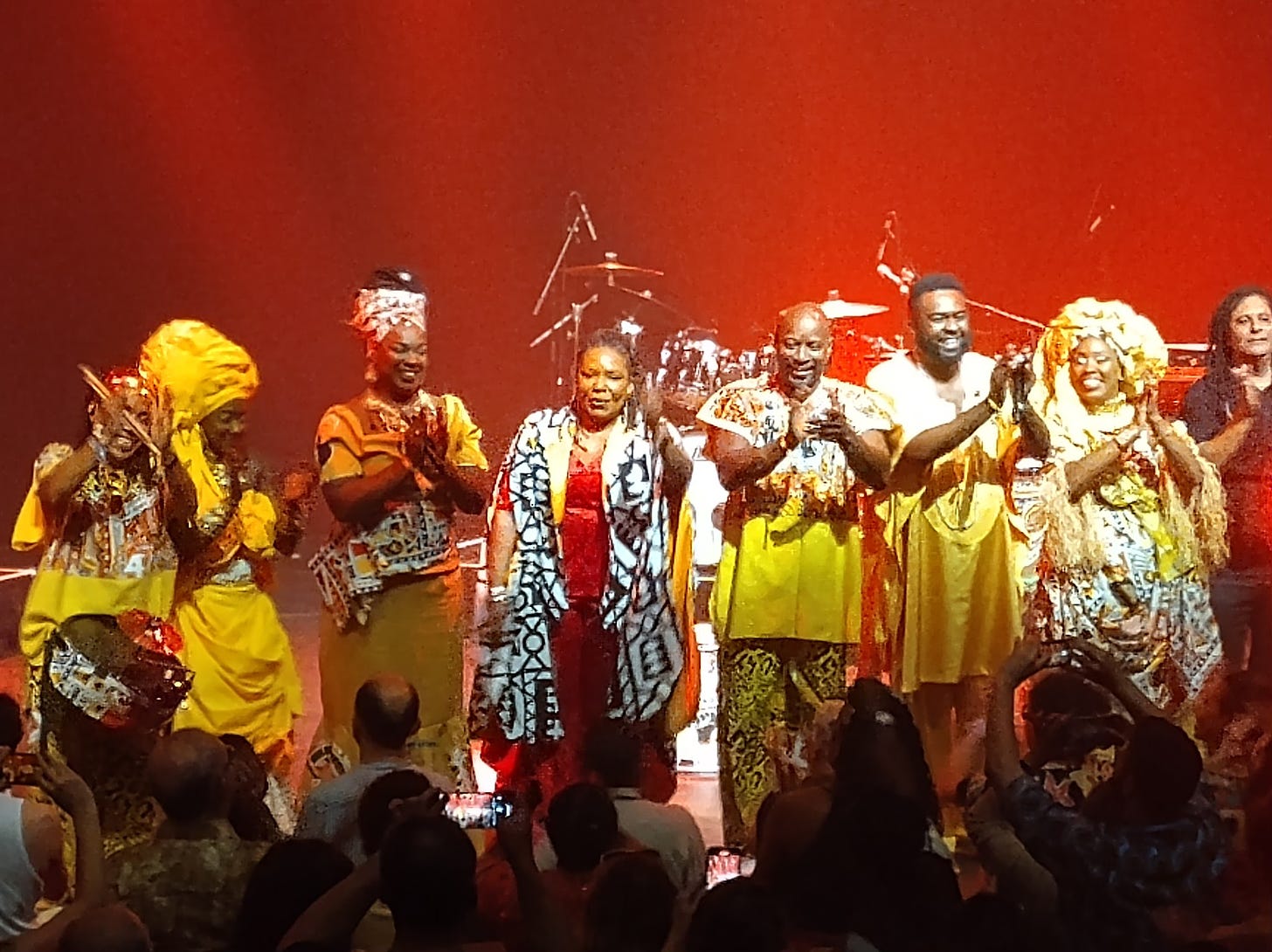
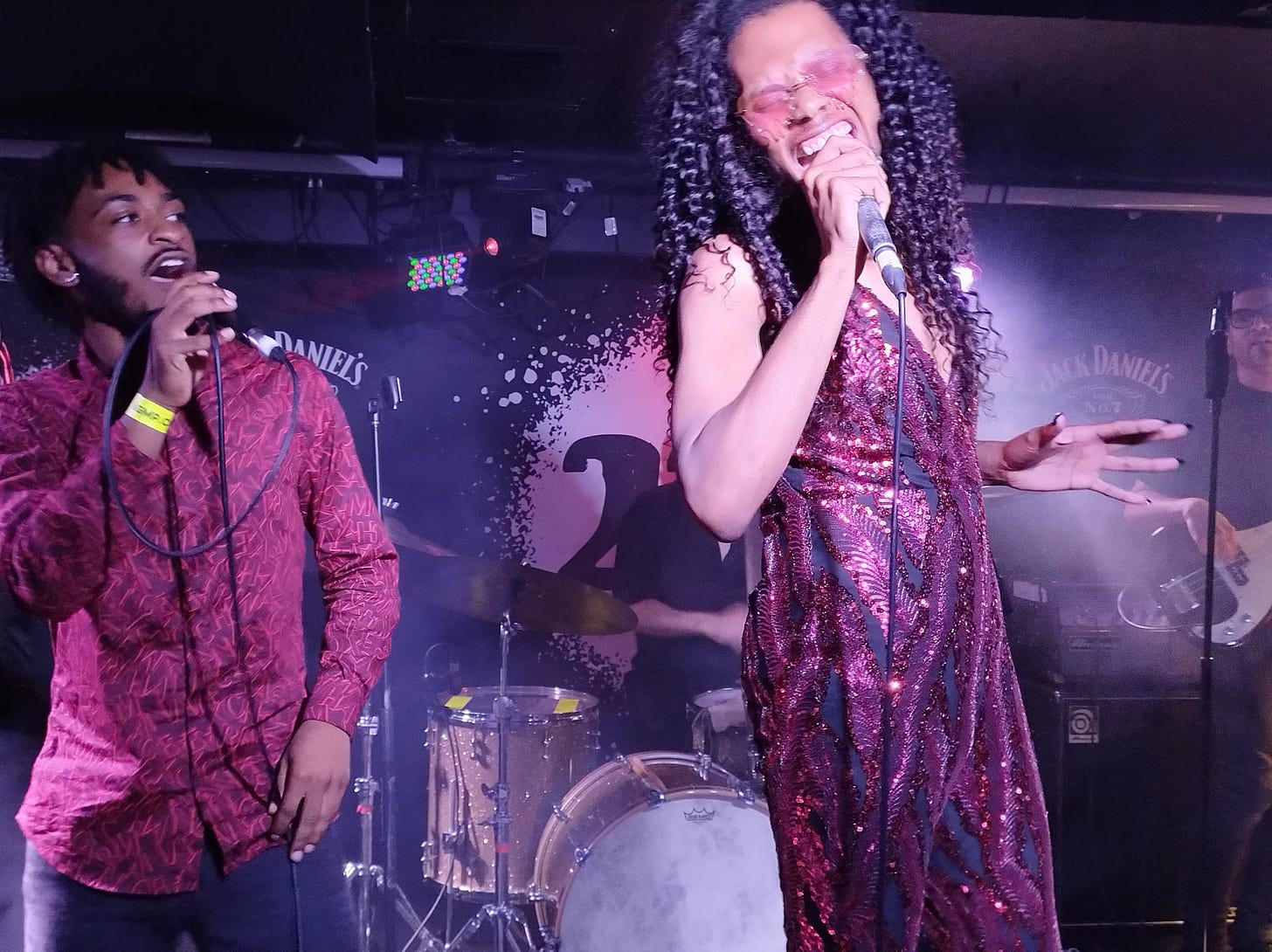
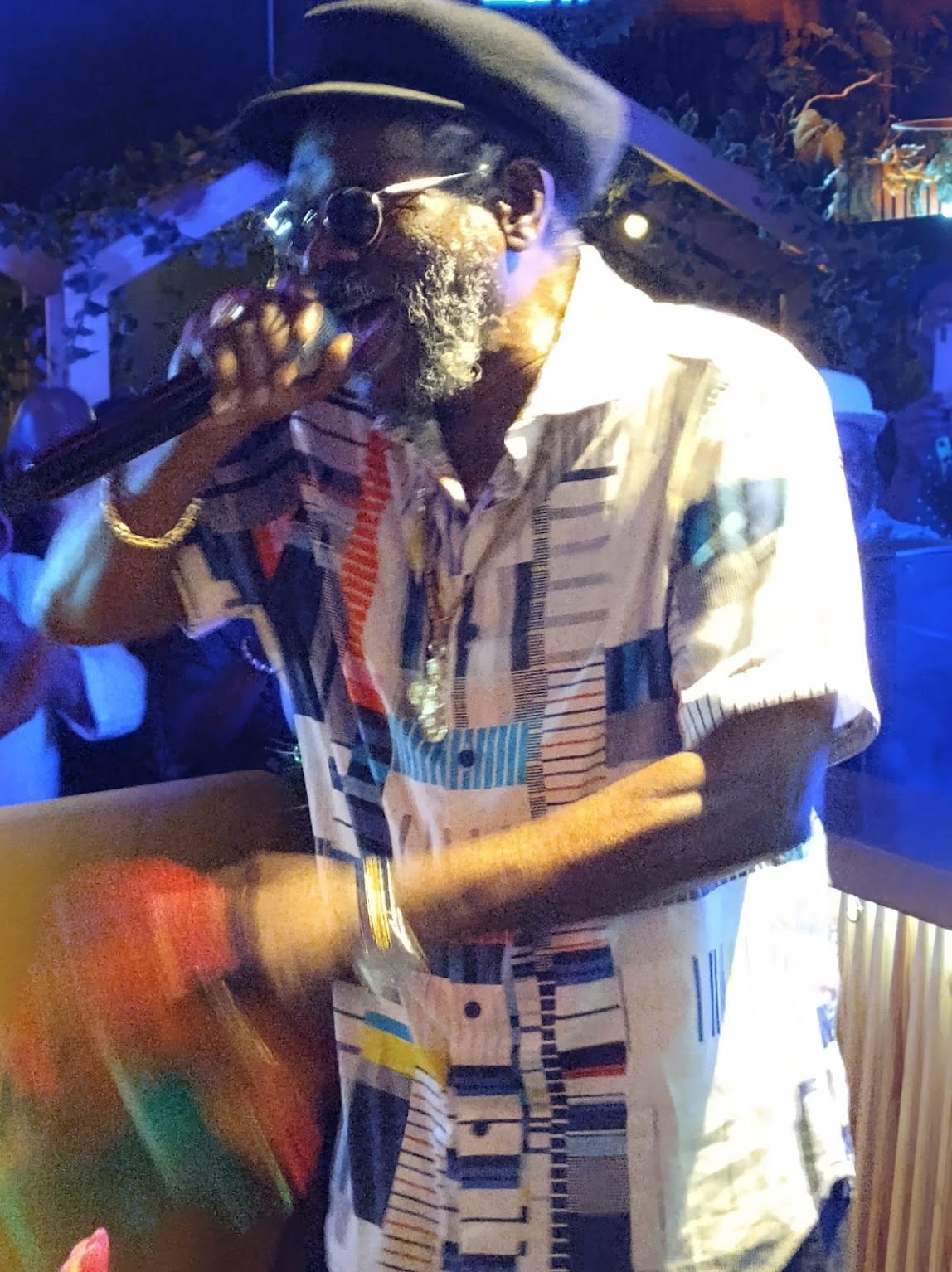
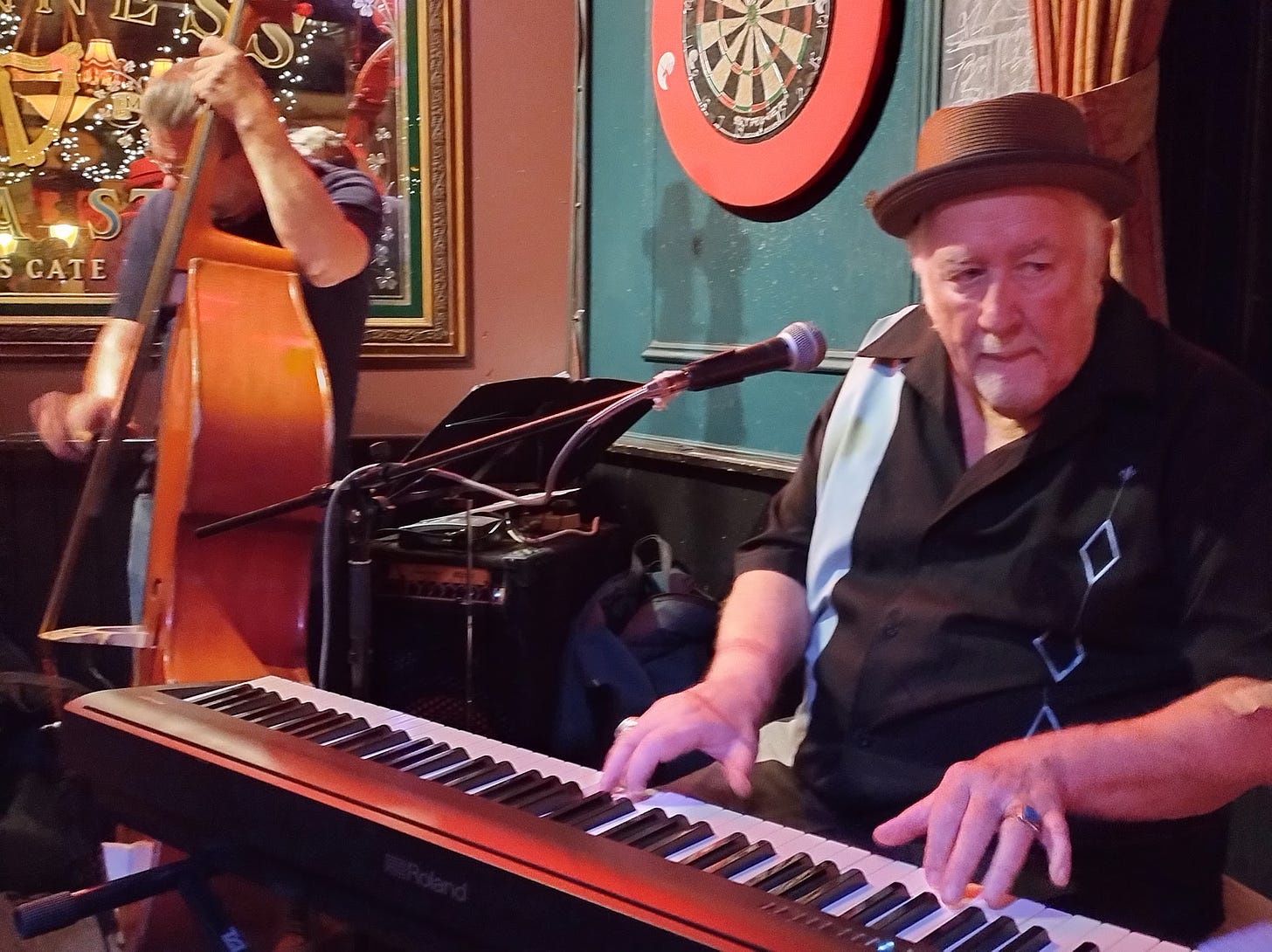
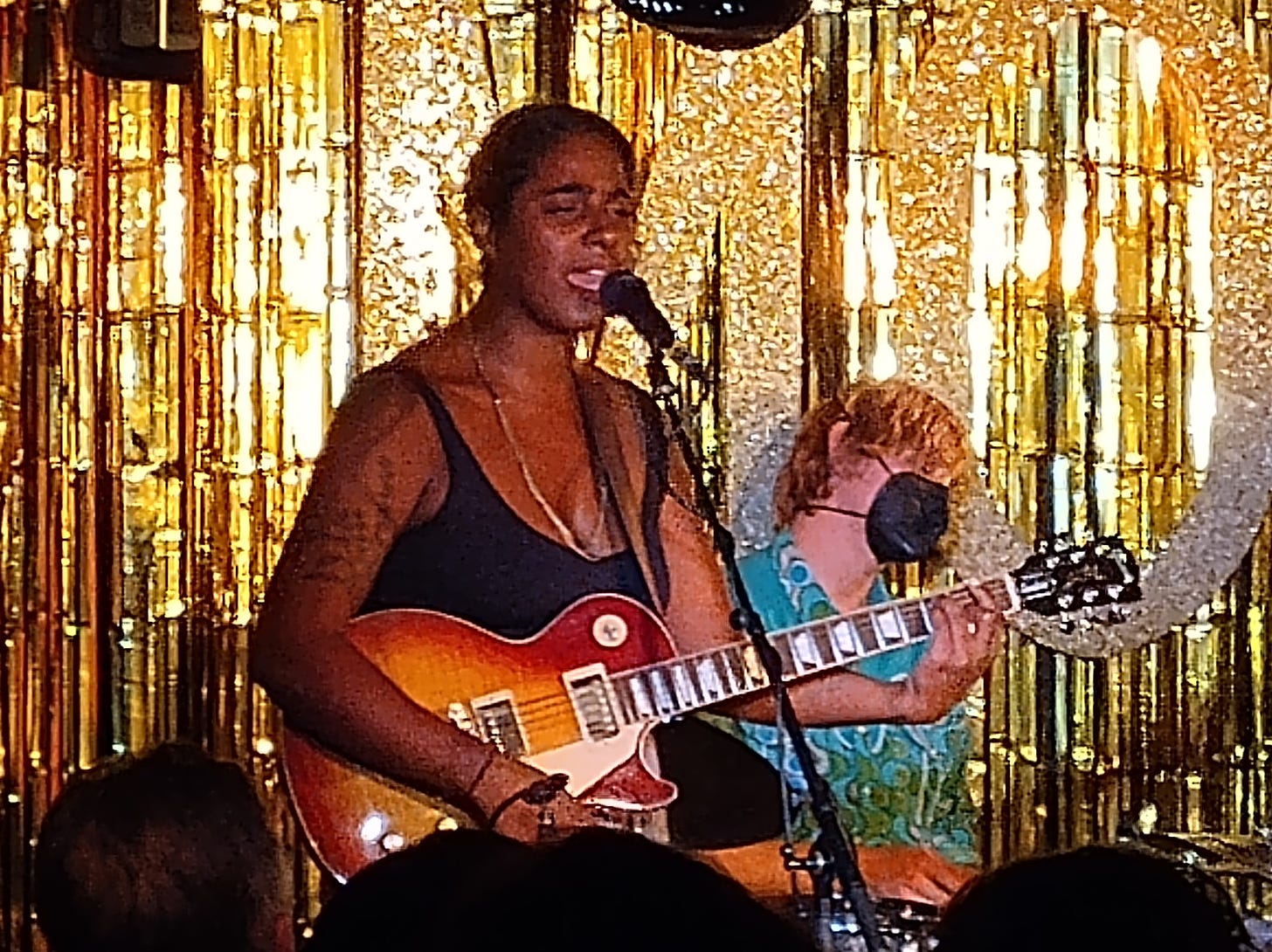
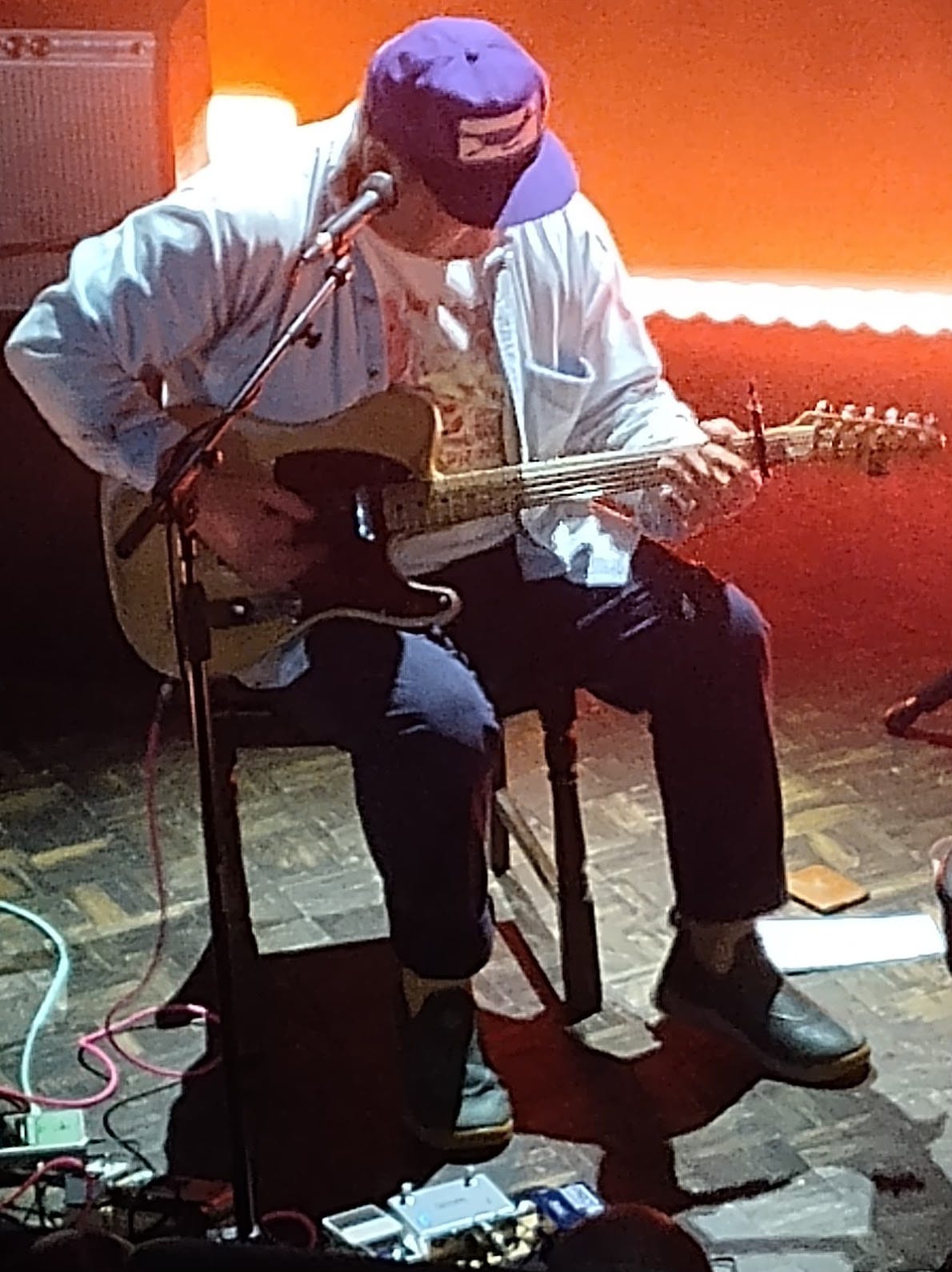
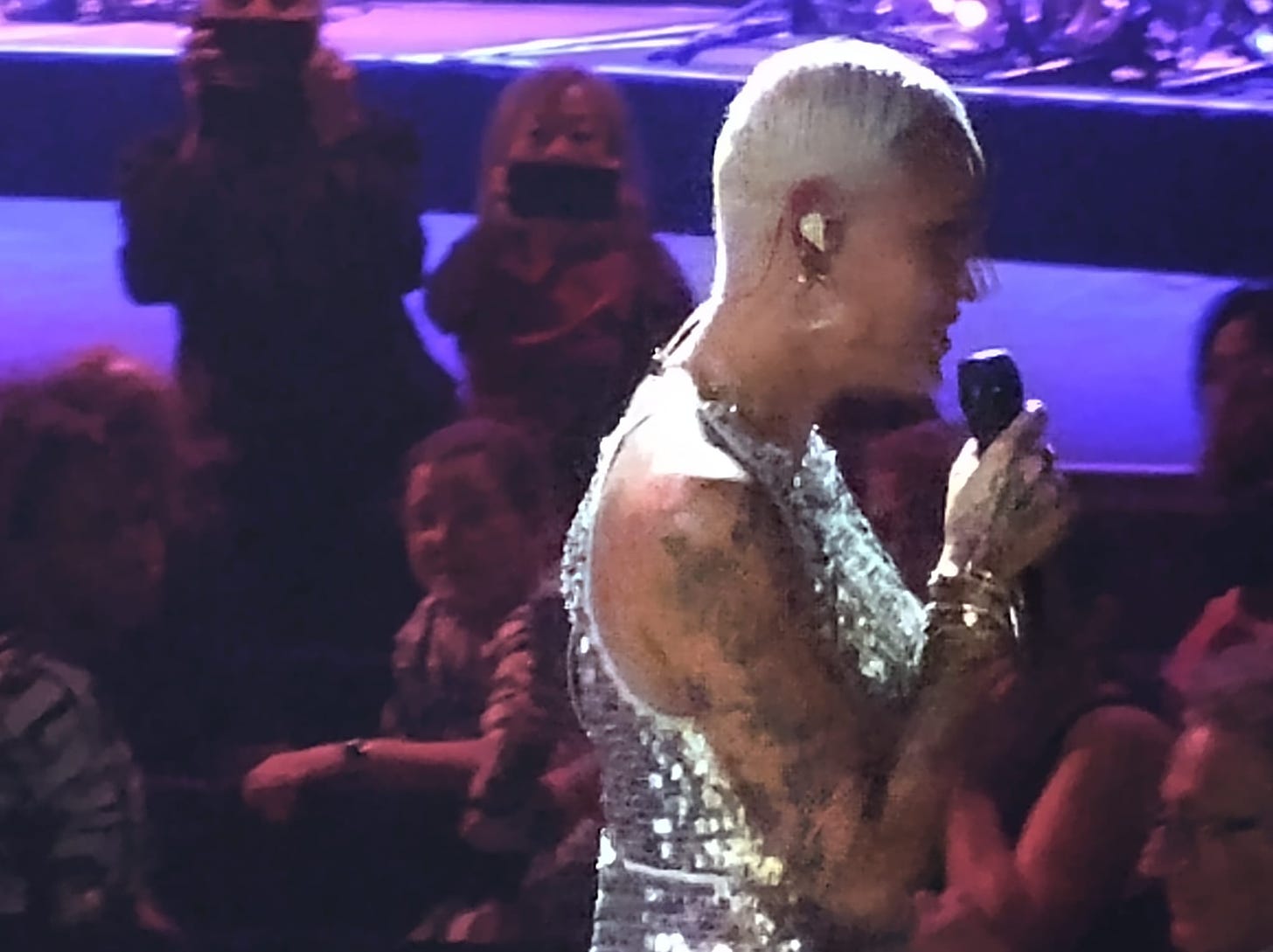
I think I need to see the person who may or may not have been in the Caroline and the chocolate drops. Thanks for the recommendation.